|
|
|
Sort Order |
|
|
|
Items / Page
|
|
|
|
|
|
|
| Srl | Item |
| 1 |
ID:
101285
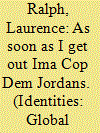

|
|
|
|
|
| Publication |
2010.
|
| Summary/Abstract |
Sudhir Venkatesh and Steven Levitt's influential 2000 article transformed the way social scientists study gangs by showing the context in which Chicago gang members built an organization modeled on a corporation. But if this research helped to demonstrate that the underground economy is a logical response to the inner city's isolation from the rest of the country, it also makes it difficult to see that the very same factors that have led to urban decay and "social isolation" (i.e., escalating unemployment, the loss of manufacturing jobs, and the emergence of gangs to fill bureaucratic voids) serve to connect gangs to wider social worlds. This study expands upon recent gang research by detailing the improvisational economic and social practices, as well as the intricate narratives, and the social practices that allow Chicago gangs and their members to access a variety of people, institutions, and resources, while marking the diverse modes of historical consciousness that gang affiliates develop. A gang that I will here be calling the "Divine Aces" forms a powerful case in point
|
|
|
|
|
|
|
|
|
|
|
|
|
|
|
|
| 2 |
ID:
152850
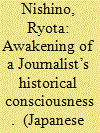

|
|
|
|
|
| Summary/Abstract |
Between 2005 and 2006 a female journalist Sasa Yukie (b. 1974) participated in and documented the commemoration of Japanese soldiers who died in the Pacific Islands during the Pacific War with other veterans and the families of deceased soldiers. Sasa’s book, Onna hitori gyokusai no shima o yuku (2007), integrates her travel experience, impressions of her fellow travellers, historical accounts, and reflections on battlefields and commemoration sites. This article charts the two-stage process of Sasa’s emerging historical consciousness in this travelogue. The first phase involves her growing empathy with her fellow tour members. Sasa follows a well-established Japanese literary trope that exalts the protagonists’ loss to a noble cause. Thus, Sasa turns tour members and dead soldiers into tragic yet honourable heroes on her terms rather than theirs. The second phase involves Sasa’s transformation into a passionate advocate for the greater recognition of and respect for deceased soldiers, veterans, and bereaved families. This article is a critical reading of this text, and argues that her travel experience was an impetus for Sasa’s nationalistic tendencies. Her reduction of the memories of war and Islanders into metaphors of hōganbiiki discourages questions about the responsibilities and suffering of those involved and implicated in the war. I argue that this book is significant because it enabled Sasa to carve a particular journalistic niche as a journalist-activist promoting the interests of Pacific War veterans.
|
|
|
|
|
|
|
|
|
|
|
|
|
|
|
|
| 3 |
ID:
142561
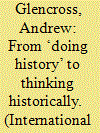

|
|
|
|
|
| Summary/Abstract |
Although most attempts to foster interdisciplinary dialogue are located outside mainstream International Relations (IR), this article seeks to problematize how the two dominant paradigms of IR theory, realism and liberalism, think historically. The argument proceeds by examining how the disciplines consider what historical knowledge is useful for, that is, how they think historically or are historically conscious. This constitutes a shift away from the dominant dialogue over how to ‘do history’ in IR. Historical consciousness is defined as the understanding of the temporality of historical experience or how past, present and future are thought to be connected. The analysis is set up to explore the extent to which both disciplines share a similar historical consciousness beyond merely treating history as instructive. To do so the article first examines the canon of European historiography to identify three genres of historical consciousness: history as teacher, history as narrative, history as representation. This survey of pre-positivist historiography serves to show the complexity of historical reflection within that discipline, something against which variance within IR theory can also be compared. Disciplinary comparison reveals that three genres of historical consciousness are present in liberalism and realism: lessons of history, revenge of history, and among progressive realists a speculative escape from history genre. Whereas lessons of history spans both ‘isms’ in IR, realism is shown to have a more complex understanding of temporality, thereby providing another conceptual starting point for distinguishing between these two ‘traditions’. Moreover, these differences between genres of historical consciousness used within realism capture the split between realists that lies not in the origin of anarchy itself but in how realists think historically. What emerges, therefore, by comparing how disciplines think historically rather than ‘do’ History, is the equally purposive or even political use of the historical knowledge they produce.
|
|
|
|
|
|
|
|
|
|
|
|
|
|
|
|
| 4 |
ID:
127782
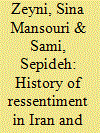

|
|
|
|
|
| Publication |
2014.
|
| Summary/Abstract |
Two dichotomies, one that resents the West and another that admires it, seem to have long polarized both Iranian intellectuals and the public imagination. Darioush Ashouri discusses this issue in terms of "ressentiment," a term he borrows from Nietzsche. This study puts Ashouri's scattered views within a Nietzschean framework to form a coherent theory, and places it against the background of a brief history of ressentiment in Iran. It then argues that signs of a ressentiment-less young generation, mostly university students, seem to be appearing, and a certain kind of social behavior on Facebook and a work by the Iranian musician Mohsen Namjoo are analyzed as evidence of this emerging mindset.
|
|
|
|
|
|
|
|
|
|
|
|
|
|
|
|
| 5 |
ID:
117888
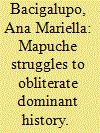

|
|
|
|
|
| Publication |
2013.
|
| Summary/Abstract |
The biographical mythohistory of Rosa Kurin, an ethnically mixed Mapuche-German shaman in southern Chile in the late 1800s, expresses a 'shamanic historical consciousness' that advances current debates over the dynamic relationship between history and myth and between indigenous and national history. Biographical mythohistory is a mixed genre that mediates among different memoralisations of the past to obliterate dominant Chilean history and to create alternative indigenous histories. Mapuche shamanic mythohistories are simultaneously linear and cyclical: historical personages are transformed into mythical characters and sometimes back again, and mythical happenings manifest themselves repeatedly in historical events. Mapuche people create mythohistories by mythologising such shamans and historical outsiders, prioritising spiritual agency over political agency and narratively reversing the usual colonial dynamics of subordination. Mythohistories are, for rural Mapuche, a means of conveying agency, ethnic identity and ontology. They also offer a way to decolonise Mapuche history and have the potential for political mobilisation.
|
|
|
|
|
|
|
|
|
|
|
|
|
|
|
|
|
|
|
|
|